- Home
- Isuna Hasekura
Spice and Wolf, Vol. 10 Page 5
Spice and Wolf, Vol. 10 Read online
Page 5
“Is this the room of Mr. Kraft Lawrence?” The voice was surprisingly youthful, and the face beneath the turban was the face of a young man.
“That’s right. I am Lawrence.”
“Oh, well then! I apologize for my appearance. I received word from Mr. Deutchmann, you see—”
Lawrence stood from his chair and walked to the door.
If he had come at Deutchmann’s invitation, then he was from the Ruvik Alliance.
“Not at all, not at all. We’re the ones who should’ve paid a visit to you. In any case, please do come in.”
“If you’ll excuse the intrusion, then.”
The man was a bit shorter than Lawrence, and he entered the room with light footsteps, despite the heavy load and clothing that should have precluded such lightness.
If he was a traveling merchant, he was one who traveled harsh climes indeed.
“What a lovely room.”
“Normally we cannot afford such niceties.”
“Ha-ha-ha, benefits of the job, eh? I enjoyed the same thing myself when I came at the beginning of autumn.”
The man had blond hair cropped quite short. His manner of speaking was pleasant and good-natured—enough so to surprise Holo, it seemed.
“Ah, I’ve forgotten to introduce myself. I am Lag Piasky of the Fias Company, affiliated with the Ruvik Alliance.”
“And I am Kraft Lawrence of the Rowen Trade Guild. Normally I’m a traveling merchant on the continent.”
“Ah, this is surely God’s will—as you can see, I, too, am a traveling merchant.”
After exchanging pleasantries, they shook hands, and Lawrence was relieved to note that the man’s hands were about as rough as his own.
Holo had taken her breakfast and moved to the bed, so after inviting Piasky to sit, Lawrence sat himself.
“What I’ve heard from Mr. Deutchmann is that you wish to visit Brondel Abbey.”
This statement did not strike Lawrence as hasty. Rather he seemed to be a sort of man that Lawrence had rarely encountered recently—a merchant who if he had time to be exchanging friendly greetings with other people would rather use that time to shave the edges off of silver coins.
“Yes—if possible, we’d like to visit the merchant house that’s closer to the main building rather than the pilgrimage house.”
Lawrence said nothing about their search for the wolf bones.
Unlike previously, when they had had no idea where the bones actually were, they now possessed the important information that the bones were likely within the abbey. There was nothing to be gained in letting slip that information.
And Piasky was from the Ruvik Alliance.
“…As you were introduced by Mr. Deutchmann, I won’t inquire as to your goal, but given what you’ve said, I assume you’re not here to purchase wool.” Piasky’s eyes looked steadily at Lawrence. Piasky’s reaction was hardly surprising—after all, Lawrence was seeking a guide to the abbey while refusing to say why.
But Lawrence did not falter. He was sure that having gained Deutchmann’s trust via Kieman and Eve, he could gain Piasky’s via Deutchmann.
Trust was the invisible currency.
Piasky finally smiled and continued, “Still, I do a bit of business guiding to the annex those interested in watching our skirmishing with the abbey, so I won’t press you. Besides, whenever people gather, that’s draw enough to bring still more people in.”
One couldn’t do business alone. Nowhere was more attractive to a merchant than a place where many merchants gathered.
And business was always more profitable if one didn’t carelessly spill one’s plans. Piasky certainly knew that much.
“The banner of the moon and shield will always fly in the wind, so I won’t worry about such minor details, eh?”
Lawrence did not neglect to inwardly add the statement that implicitly followed that one: But if you interfere with our business, we will spare you no mercy.
“Thank you very much. I’ll make sure your consideration is a good one.”
Piasky’s smile at hearing this was a bright one, proving that he was indeed a real merchant.
Lawrence shook hands with him again, formalizing their contract for the time being.
“Now, then, as I am a rather impatient person, I’d like to discuss our departure. May I assume both your companions will be coming along as well?”
“Yes. Will that make us unable to use the pretense of wool buying?”
Col was one thing, but Holo in no way resembled any sort of merchant.
“Hardly. It’s not uncommon to bring a member of the clergy along on a business venture for the sake of one’s spiritual tranquility, after all. And things at the merchant branch of the abbey are quite lively at the moment, so it’s unlikely your companions will be noticed, no matter who they are. So long as we can pass through the gates, we’ll have no troubles.”
“I see, good.” Lawrence made certain to act especially relieved.
He wasn’t particularly trying to deceive Piasky—but the man’s manner was so easy and pleasant, Lawrence was careful to remain on his guard.
“So, about our departure…”
“We can leave any time.”
“I see…actually, as I function as the agent between the abbey and a mainland trade house, I estimate that there’s some value in setting out as quickly as may be possible.”
His faintly sarcastic way of speaking seemed to be a deliberate parody of the roundabout manner of the people of Winfiel.
Lawrence looked at Holo and Col.
Both of them nodded that they were ready.
“Since this is all at our behest, we’re happy to leave immediately.”
“I appreciate that. I’d like to try to embark around the midday bell.”
“And will we travel on foot?”
“No, by horse. Though the snow is yet thin here, toward the abbey it’s gotten rather deep. I’ll make arrangements for the horses myself, but please bring your own rations. Oh, and also—” Piasky smiled and added one final statement very deliberately. “—There’s no need to change your coin into the local stuff.”
The first thing a traveling merchant did in a new region was exchange his money.
Lawrence made no attempt to hide his laughter at Piasky’s joke, a joke that only a fellow traveling merchant would make.
CHAPTER TWO
Col sat ahead and Lawrence was the farthest back. Between them was Holo, and even so the horse atop whose back they all sat had strength to spare.
The long-haired steeds that pulled sleighs across the plains of Winfiel were every bit as big as the rumors claimed.
“Hmph…awfully arrogant for a mere horse.”
Such were the words that Holo let slip upon seeing the mounts that Piasky had made ready for them at their meeting place.
Of course, Holo’s true form was far larger than even this horse.
Holo’s grumbling was likely rooted in her frustration at her own ignorance—the limitations of her own knowledge compared with the vastness of the world.
On the continent, horses like this one were hardly a common sight.
“Are you all prepared?” Piasky asked, holding the reins while atop a more common horse.
Lawrence replied that they were. The only reason he, too, did not have reins in his hand was because the packhorse’s driver held them.
A horse of such size would be wasted if it were merely being ridden. Even a mule that looked like it would run short of breath carrying a child could haul the baggage of four people, as long as it was properly loaded.
Lawrence looked back and saw a cart piled high with goods. Among them was food and wine for the abbey’s merchant branch. Evidently once the roads were covered in snow, wagons were traded for sleighs.
Piasky’s role was to mediate between the abbey and the continental trade companies, facilitating the flow of information as well as goods such as these.
“Now, then, let us pray to God for safe travels.
”
As befitted a trip to an abbey, they gave such prayers as the midday bell rang and then set off.
The weather was poor and temperatures very low.
Worse, the snow hadn’t quite covered the town and instead mixed with the road’s dirt, becoming mud that dirtied the cuffs of all who walked it.
But they left the town and continued on across the harvested plains, which were nearly entirely white.
It was scenery worthy of the “nation of plains,” for so it was called, and no matter the direction one looked, the white expanse stretched on and on, and they followed a path of dirt churned up by the feet of humans and horses that sliced through it.
Everyone was wearing many layers of clothing. Lawrence and his companions even wore thick leather overcoats they had borrowed from the inn, as well as gloves.
But sitting still atop a horse as they traveled over such land, the cold inevitably found its way past their coats. Eventually Holo enveloped Col within her own coat, and Lawrence drew Holo into his.
Silence reigned over their travel. The only sounds were the tik, tik of snowflakes hitting coats and the long, reluctant breaths of cold air they drew into their lungs, that sound magnified by the silence.
People of the north country spoke little, and what they did speak was uttered through lips barely parted, it was said—and Lawrence could easily understand why.
And of all the various restrictions that monks imposed on themselves during their pilgrimages, the rule of silence was the easiest to comprehend.
Thanks to the snow, darkness fell early, and though their travels had not been lengthy, Lawrence and his companions were exhausted by the time they reached the first inn.
A famous monk had once said that idle chatter was a pleasure, and the truth of those words was entirely clear.
And yet Lawrence, Col, and Holo were laypeople, not clergy.
The least clergy-like of them, Holo, seemed most affected by the monotonous silence, and upon reaching the room, she fell straight onto the bed, not even bothering to brush the snow from her hood.
For his part, Lawrence was in no mood to chastise her. He was sure his face looked no better than Col’s, who sat exhausted on a chair.
It was the face of one whose energy reserves were gone, but if told to stand and walk, he would struggle to his feet and continue trudging forward—the face of one whose spirit had given out ahead of his body.
In the northlands, there were many tales of the wandering dead, no doubt from people catching sight of travelers in such a state.
“Col.”
After Lawrence said the boy’s name, Col looked up at him with a corpse-like expression.
“If you smile, you’ll feel better.”
Col had traveled alone and was surely aware of that particular trick. He nodded and forced a smile.
“Now, then, let us go get dinner. I expect Piasky has arranged to have it served.”
“All right,” replied Col, standing.
As the boy obediently removed his snow-covered coat, Lawrence took Holo’s cloak as she continued to lie facedown and motionless on the bed.
“I’m sure you know this, but you won’t be able to sleep like that. You’ll feel better if you go someplace warm and drink some wine.”
Drowsiness and exhaustion were similar but different.
Holo’s drooping ears twitched, as though to say, “I know, I know.”
But despite knowing, she made no move to rise, like a person unwilling to leave their warm bed in the morning.
With no other option, Lawrence picked her up and saw that the expression on her face was like a girl cursed to sleep until some hero came to awaken her with a kiss.
Lawrence, of course, was no hero.
A different sort of magic would be required to break the curse on Holo.
“I hear the liquor here is such that a simple spark will set it aflame,” he whispered into her drooping ears, which pricked up into sharp triangles.
It was as though she were asking, “Truly?”
“Weak liquor soon freezes and becomes undrinkable, so they make it strong enough to store in ice and remain unfrozen. And though it’s colder than ice, drinking the burning stuff will warm you right up.”
A bit of sparkle returned to Holo’s eyes.
She gulped, the sound of her swallowing signaling the breaking of the curse.
Holo stood unsteadily, a bit of strength returning to her tail, which had drooped like the tail of a stray dog that had not eaten in three days.
“Still, we may only have pickled cabbage to go with it,” Lawrence made sure to say, hoping to head off her anger at discovering as much after the fact.
Holo seemed briefly unsteadied by this qualification, but the allure of the liquor was evidently enough for her to regain her vigor.
“’Tis better than nothing.”
“That’s the spirit.”
Their exchange as they left the room made Lawrence think of something. The strong liquor they had drunk at a town they had stopped at earlier in their journey had reminded Holo of her homeland’s wine.
If strong liquor reminded Holo of home, that would certainly be a singular flavor. What better nourishment could there be when one was so exhausted?
Evidently it would take roughly two more days to reach Brondel Abbey.
Lawrence counted the coins in his coin purse, careful not to let Holo notice him doing this.
A way station’s food is expensive, poor, and foul-smelling.
Even a piece of scripture fit for a child to memorize was not as easily remembered as that truism.
And as though trying to live up to those words, the smell of dishes on the table next to them wafted over, rank and garlic-smelling.
The smell of garlic was synonymous with poverty. Despite Lawrence being sure he and his companions tended to eat thriftily, it was times like this when the ill effects of extravagance were laid bare.
The only one whose stomach growled at the prospect of the food at the next table over was Col, who until recently had traveled by gnawing on meager turnips.
It had been a long time since Lawrence had encountered this scent, but he still could not muster much appetite at its prospect—to say nothing of the keen-nosed Holo.
But Lawrence and his companions were lucky, not because they had plenty of money and not because the way station’s kitchen had run out of garlic.
They were lucky because Piasky had anticipated this happening and taken matters into his own hands.
“Since I travel quite a lot in the northlands, I often wind up having to stop over because of the snow. Helping out with the cooking has gotten me not half bad at it,” he said, then placed a simple mutton stew in the center of the table—“simple” being a salt broth with onions, ginger, and turnips, along with some mutton jerky and leg bone all boiled together.
But of course, there was one special, crucial ingredient hidden among all that.
Piasky lowered his voice before revealing the secret ingredient, which turned out to be the very same thing that the people at the next table were so reluctantly eating: garlic.
Evidently a small amount of garlic was very important for this stew, with its thin skim of yellow oil covering the surface of the broth.
The stew was served in a well-used, old wooden bowl, garnished with a piece of oat bread that by itself looked like it would have been tough to chew—but it was meant to be soaked in the warm stew broth before eating. This allowed even the famously difficult-to-chew oat bread to be enjoyed.
Lawrence was deeply grateful to Piasky, not only because the food was delicious, but also because it distracted Holo from the liquor they had been discussing.
“In places where there are no rivers or ponds, the water you carry with you tends to turn rancid, but if you mix it with ingredients like these and boil the lot of it, even bad water is all right.”
Holo gnawed away on the mutton, wooden spoon in hand. She was already on her third bowl. Even the usuall
y restrained Col went in for seconds—proof of how tasty the stew really was.
“It would be amazing if you could make stew this delicious from even rancid water…But this is only practical when you’re traveling in numbers, I would think. If you made this all the time while traveling alone, it would surely be a waste of money.”
“Right you are. When I was younger and traveling hither and yon with caravans, I often had cooking duties foisted upon me.”
Traveling with a large group of merchants was good for business and made for a safer journey. But Piasky’s affect had the keen edge of a man well accustomed to traveling alone. The impression Lawrence had immediately gotten from him was that of a solitary merchant scaling a steep cliff.
This was evidently something people often told Piasky. He explained, “Of course, that’s all in the past. A group of merchants is after all only a group. It’s not a family.”
“Whenever a crisis comes, they’ll only offer you a helping hand if they’ve decided there’s some profit in it for them.”
Piasky’s lips twisted. “Quite right,” he said with a helpless shrug.
Before he had begun sitting alone in the driver’s seat of his cart, Lawrence had occasionally traveled with other merchants, and when business was good, he had stayed with the same group for a while.
As to why he’d stopped doing it—it was probably overstatement to suggest that relationships formed solely for profit were doomed to distort into resentment, but his reason was likely the same as Piasky’s.
When his group had been attacked by wolves, they all fled, each praying to God that it would be one of the others who was caught.
And when one of them finally drew the losing lot, Lawrence wondered just how much God’s heart was stirred by their desperate cries for help.
“Also, I was well aware that even a group of traveling merchants have no hope against the merchants of a town. So in the end I decided to become the hand of one of those town merchants. I’m less free than I was, but in every town where we have influence, I’m greeted with smiles. It’s worthy compensation.”

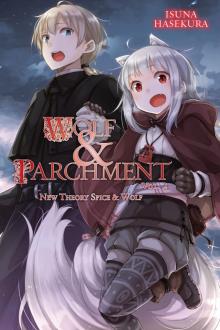 Wolf & Parchment, Volume 2
Wolf & Parchment, Volume 2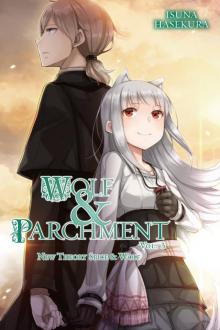 Wolf & Parchment, Volume 3
Wolf & Parchment, Volume 3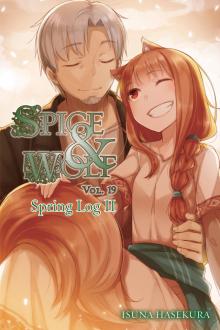 Spring Log II
Spring Log II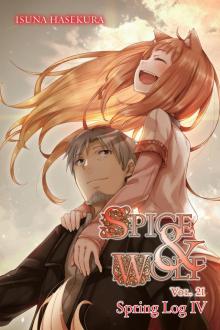 Spring Log IV
Spring Log IV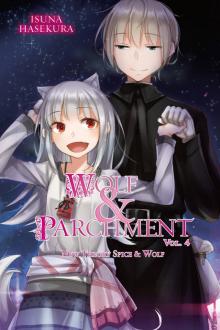 Wolf & Parchment: New Theory Spice & Wolf, Vol. 4
Wolf & Parchment: New Theory Spice & Wolf, Vol. 4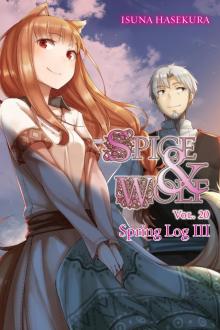 Spring Log III
Spring Log III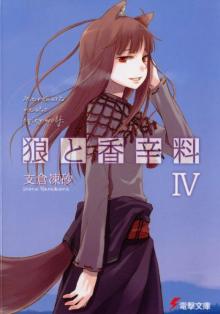 Spice & Wolf IV
Spice & Wolf IV Spice & Wolf X (DWT)
Spice & Wolf X (DWT) Spice and Wolf Vol. 2
Spice and Wolf Vol. 2 Spice & Wolf XIII (DWT)
Spice & Wolf XIII (DWT) Spice and Wolf, Vol. 10
Spice and Wolf, Vol. 10 Spice & Wolf XVI (DWT)
Spice & Wolf XVI (DWT) Town of Strife I
Town of Strife I Spice and Wolf, Vol. 5
Spice and Wolf, Vol. 5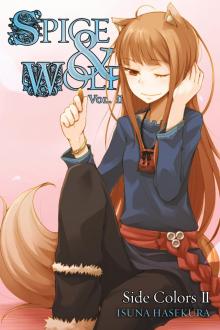 Side Colors II
Side Colors II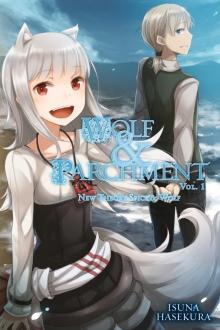 Wolf & Parchment, Volume 1
Wolf & Parchment, Volume 1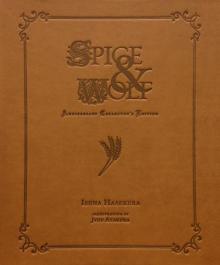 Spice & Wolf Omnibus
Spice & Wolf Omnibus Spice & Wolf XII (DWT)
Spice & Wolf XII (DWT)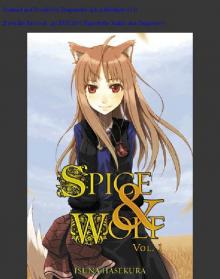 spice & wolf v3
spice & wolf v3 Spice & Wolf
Spice & Wolf Spice & Wolf VIII (DWT)
Spice & Wolf VIII (DWT) Spice and Wolf, Vol. 4
Spice and Wolf, Vol. 4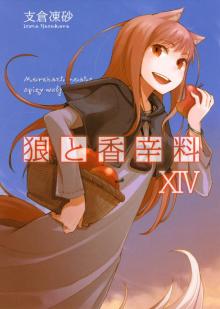 Spice & Wolf XIV (DWT)
Spice & Wolf XIV (DWT) Spring Log
Spring Log Spice & Wolf III
Spice & Wolf III Spice & Wolf VII - Side Colors
Spice & Wolf VII - Side Colors Spice & Wolf XV (DWT)
Spice & Wolf XV (DWT) Side Colors
Side Colors Side Colors III
Side Colors III Spice & Wolf VI
Spice & Wolf VI Spice & Wolf IX (DWT)
Spice & Wolf IX (DWT) Spice & Wolf V
Spice & Wolf V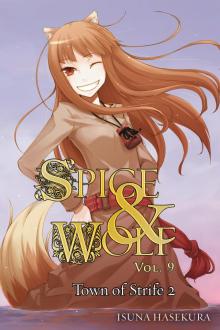 Town of Strife II
Town of Strife II Spice & Wolf XI (DWT)
Spice & Wolf XI (DWT) Spice and Wolf, Vol. 12
Spice and Wolf, Vol. 12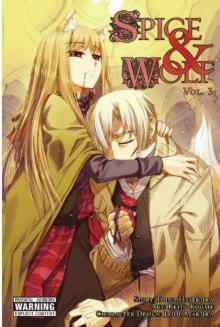 Spice and Wolf, Vol. 3
Spice and Wolf, Vol. 3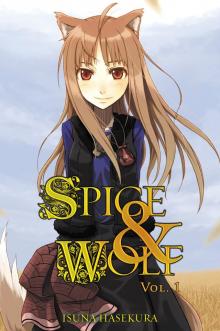 Spice and Wolf, Vol. 1
Spice and Wolf, Vol. 1 Spice & Wolf XVII (DWT)
Spice & Wolf XVII (DWT) Spice and Wolf, Vol. 6
Spice and Wolf, Vol. 6 Spice & Wolf II
Spice & Wolf II